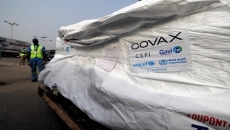New research from experts at Simon Fraser University suggests British Columbia should change its COVID-19 vaccine rollout plans to prioritize essential workers who can't avoid contact with others.
The experts outline in a paper, which is yet to be peer-reviewed, how mathematical modelling shows vaccinating essential workers earlier could prevent more infections and deaths than starting with the oldest residents before reaching younger people.
The experts in mathematical modelling say the shift in strategy for vaccinating the general population would also save millions in health-care costs and reduce instances of so-called long COVID, or people who experience symptoms for more than 28 days.
The third phase of B.C.'s immunization campaign is set to start in April and last until June, reaching people between the ages of 60 and 79, along with those who are highly clinically vulnerable, such as cancer patients.
The researchers say their modelling shows prioritizing workers in essential services including teaching, retail, food production and law enforcement would reduce the amount of virus circulating in the population and provide "a significant level of indirect protection for older adults."
Paul Tupper, a mathematics professor and co-author of the paper, says it might seem counterintuitive to shift away from prioritizing older people at greater risk of severe illness, but the best way to protect them is to keep the prevalence of COVID-19 down in the general population.
"A very effective way of doing that is vaccinating people that have lots of contacts as part of their job," he said in an interview Wednesday.
A key consideration is that although the vaccines approved in Canada so far are effective, five to 10 per cent of people who get both doses may not be protected, along with those who decline receiving the shot, Tupper said.
That means as many as 20 to 30 per cent of people targeted in the next phase of B.C.'s immunization campaign may not be protected from getting sick with COVID-19, he said, but it's possible to prevent exposure by reducing transmission among people in greater contact with others.
The modelling concludes that vaccinating B.C.'s essential workers sooner, rather than an oldest-first strategy, would prevent more than 200,000 infections and more than 600 deaths.
During a news briefing on Tuesday, provincial health officer Dr. Bonnie Henry stuck by the plan to begin an age-based vaccination campaign in the spring, saying the approach has been "supported across the world."
B.C. officials would consider changing the plan to include essential workers if enough doses of vaccine became available, she said.
The first phase of B.C.'s immunization campaign launched in December and focused on health-care workers in hospitals, paramedics, residents and staff at long-term care homes, and remote Indigenous communities.
The second phase set to wrap up in March includes people aged 80 and above, Indigenous elders 65 and up, Indigenous communities that didn't receive vaccine in the first phase, as well as more health-care workers and vulnerable populations living and working in certain congregate settings.






